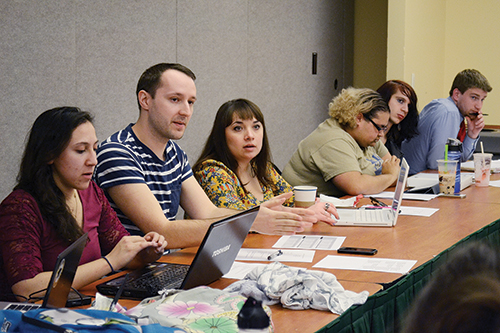The budget for Portland State’s student groups came down to the wire Wednesday night as the student government senate voted to pass an updated budget to fund groups and programs next fiscal year, just five days before it was due to the university president for approval.
ASPSU senate do-over meeting largely a repeat performance

The budget for Portland State’s student groups came down to the wire Wednesday night as the student government senate voted to pass an updated budget to fund groups and programs next fiscal year, just five days before it was due to the university president for approval.
The same updated budget, which kept compensation for some student leaders from dropping more than it initially outlined, originally passed at last week’s now-invalid senate meeting
after objections from some senators who are facing steep pay decreases.
The meeting was invalidated after the judicial board ruled that the meeting did not comply with Oregon’s Public Meeting Law guidelines for public notification.
“Overall, I think it went about as well as it could have,” said KPSU Station Manager Jay Turk. “Obviously there’s a budget shortfall.” Although Turk said KPSU and the other publications didn’t get what they wanted—that is, to maintain the current funding level—they did avoid devastating cuts.
“[Next year’s] budget is more than $70,000 below our current levels, but $70,000 above what was initially given to us,” Turk said. “It counts as a victory, although it’s a compromise.”
Thanks to declining enrollment, the total collected by the $216 a student taking 12 credit hours pays each quarter to support student organizations is projected to decrease 1.7 percent. This drops the total to $13.86 million next fiscal year, which runs from July to the end of May. This decrease, along with the creation of new student fee-funded programs such as the Veterans’ Resource Center and a commitment to keep the fee flat, did not allow for growth—or even for flat funding in most areas.
“The system the SFC proposed more or less proposes large decreases to everyone,” said Student Fee Committee (SFC) Chair Nick Rowe.
Turk, along with other leaders in student publications, including Erick Bengel, the Vanguard editor-in-chief, attended many senate and SFC meetings over the last month to voice their concerns, eventually suggesting changes to the budget. Although some senators criticized the updated budget for decreases in compensation for the lowest tier, which includes the most student leaders, SFC Vice Chair Katie Slayden disagreed.
“I think it’s fair for publications to bring a publications-only proposal,” Slayden said. “We haven’t actually seen any other proposals, so to criticize them for a lack of proposals from other groups is incredibly unfair.”
Under the leadership award model that will govern the pay of most student leaders next year, a tier system determines compensation based on responsibility and expected hourly commitment. Using the system to calculate the worth of vastly different positions, such as student government and publications, is one reason ASPSU Vice President Marlon Holmes said he opposed the budget.
“Tier systems don’t work because the people at the bottom get crapped on,” Holmes said, adding that if the student fee was returned to last year’s levels of $220 per 12-credit-hour
student per quarter, which would raise close to $275,000, the debate would probably not be happening. “If we had that $4 [per student] back, the tier system would look a lot different.”
After passing the revised budget, the second half of the meeting was largely devoted to delineating where the powers of the senate and judicial board begin and end. At last week’s now-invalid meeting the senate voted to amend the judicial board’s bylaws, an action the judicial board later ruled was prohibited based on their interpretation of the ASPSU constitution, said ASPSU President Tiffany Dollar.
The amendment in question dealt with whether candidates for student office should be required to attend a mandatory orientation meeting to be eligible to run for office, something Dollar said benefits the elections process through team building and letting candidates get to know the rules.
“It helps you treat your opponents like real people,” Dollar said.
Judicial Board Chief Justice Aubrey Hoffman disagreed with the need for the orientation, saying that requiring them will make it difficult to complete voting by the first week of May, as constitutionally-required, while also not achieving the results hoped for by the senate. “Did you see [team building] last year?” she said of the elections cycle. “It’s a pie-in-the-sky goal.”
The senate ultimately introduced a resolution that overturned the judicial review board’s previous ruling on the senate’s vote regarding the bylaws, and subsequently voted to change them again, requiring mandatory orientation for students seeking office.
“It seems like the senate is substituting their judgment for the judgment of two people who’ve actually run an election,” Hoffman said. When asked to describe the meeting in a sentence or two, she answered, “Disappointing.”






